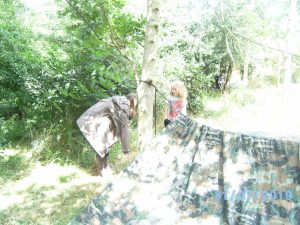Our top tips on isolation with kids
 We’re facing challenging times ahead, and the thought of isolation and home-learning can be a daunting prospect for many of us. Every child is unique, with different needs, capabilities, interests, energy levels and sensitivities. There won’t be a one-size-fits-all formula and it may take some time to discover what works best for you and your child(ren).
We’re facing challenging times ahead, and the thought of isolation and home-learning can be a daunting prospect for many of us. Every child is unique, with different needs, capabilities, interests, energy levels and sensitivities. There won’t be a one-size-fits-all formula and it may take some time to discover what works best for you and your child(ren).
The wealth of information and advice online, can be overwhelming, so we’ve pulled together some key tips to get you started and to try and help maintain a happy home, continued learning and maybe even some exciting adventures along the way.
Routine. Not being at school with a set routine can be really unsettling for some children and many will benefit from a structure over the coming weeks. Create a plan/rhythm to your days by building in regular activities. Allocate times for completing school work, exercise, screen time and of course for just having fun and playing.
But allow yourself to be flexible – see what works best for you. If your child is engrossed in a book let them carry on, if a short walk turns into an adventurous ramble, enjoy your time in nature together.
Flexibility and allowing yourself to be spontaneous and surprising the kids every now and then will help relieve any boredom that may start slipping in and will reduce your stress levels of having to achieve everything you’d set out to.
Involve them. Let them have some input into the days ahead. Is there anything they’re keen to do or learn about during this time? Create a list together, engage with them and take into account their feelings, needs and wishes. Discuss ideas for weekly themes that you could build their learning around if your school is unable to provide tasks.
Learning resources. If you’re looking for inspiration in addition to what their school has sent home or if your kids are just keen to learn more, there are lots of resources available online, both free and subscription.
Some teacher recommendations include:
If you can’t get out of the house there are a range of Virtual tours available online:
Older children might be interested in completing an Arts Award from home
Reading. Reading aloud to/with your children can improve their vocabulary and attention span, as well as increasing their imagination and providing a launch pad for a variety of conversations.
Create. Flex your creative muscles, whether it’s drawing, painting, baking and cooking, junk modelling, play-doh, flower pressing, paper aeroplanes, story-telling or even a treasure hunt. If you’re stuck for ideas, you can find lots of inspiration online.
Exercise. Build regular exercise into your daily routine – kids will have plenty of energy to burn off! Whether you follow an online workout or yoga class, or simply play tag in the house or garden, keeping fit and healthy should be high on your list of things to do.
 Time in nature. Our connection with nature has been proven to have many benefits, including improving our mental health. Now, more than ever, spending time in open spaces can be the tonic you need to get your through time in isolation. We’re lucky in Frome to have plenty of green spaces within walking distance from the town centre. If visiting these spaces, please take care to comply with the 2m social distancing guidance.
Time in nature. Our connection with nature has been proven to have many benefits, including improving our mental health. Now, more than ever, spending time in open spaces can be the tonic you need to get your through time in isolation. We’re lucky in Frome to have plenty of green spaces within walking distance from the town centre. If visiting these spaces, please take care to comply with the 2m social distancing guidance.
Special Time. If you have more than one child, giving both/all your children the attention they want during this time, isn’t going to be easy. Try and factor in a chunk of between 10 and 20 minutes to spend solely with one child. Let them lead the way and chose what to play or do. Focus on them and what they’re interested in for those 10-20 minutes. Be positive and supportive and try to refrain from adjusting their ideas and plans.
Playdates. They may not be able to visit each other, but we’re lucky enough to have the technology – Skype, Facetime, Zoom – to allow them a catch up with their friends and to share what they’ve been up to.
Music. This is a great time to share your music library with your kids – introduce them to new genres and styles. Create play lists for dancing, exercising or relaxing. Play music – sing, dance, make up your own songs.
Screen time. Set the boundaries from early on. If you have children who play games online with their friends, set regular times and curfews for when everyone will be on/offline. If children know none of their friends are gaming at certain times, it’ll reduce the fear of missing out and make home learning easier.
Try and make some of the screen time beneficial – crack open the documentary box sets, download educational apps, learn a new language, follow online tutorials for crafts or science projects.
Challenges. Set a daily or weekly challenge but let them choose if and when they do it. Could be something to help improve or learn a new skill.
Self care. Don’t be too hard on yourself. You can’t take good care of your children if you don’t take care of yourself. Try and make time for yourself to do what relaxes you. Pick up the phone, keep in touch with friends and family, allow yourself to express any frustrations you may have.


